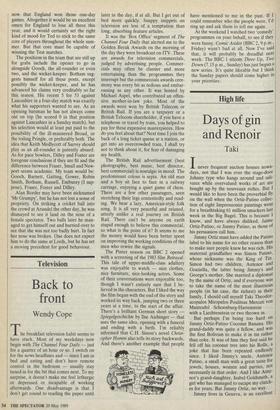Television
Back to
front
Wendy Cope
The breakfast television habit seems to have stuck. Most of my weekdays now begin with The Channel Four Daily — just for a quarter of an hour or so. I switch on for the news headlines and — since I am in bed and eating and don't have remote control in the bedroom — usually stay tuned in for the bit that comes next. To my surprise, it doesn't make me feel lethargic or depressed or incapable of working afterwards. One disadvantage is that I don't get round to reading the paper until
later in the day, if at all. But I get out of bed more quickly. Snappy snippets on television are less of a temptation than long, absorbing feature articles.
It was the 'Box Office' segment of The Channel Four Daily that alerted me to the Golden Break Awards on the morning of the day they were broadcast on ITV. These are awards for television commercials, judged by advertising people. Commer- cials may often be classier and more entertaining than the programmes they interrupt but the commercials awards cere- mony was every bit as tedious and embar- rassing as any other. It was hosted by Michael Aspel, who contributed an offen- sive mother-in-law joke. Most of the awards were won by British Telecom or British Rail. If you are a taxpayer or a British Telecom shareholder, if you have a telephone or travel by train, you helped to pay for these expensive masterpieces. How do you feel about that? Next time I join the back of a long ticket queue at a station, or get into an overcrowded train, I shall try not to think about it, for fear of damaging my health.
The British Rail advertisement (best photography, best music, best director, best commercial) is nostalgic in mood. The predominant colour is sepia. An old man and a boy sit face to face in a railway carriage, enjoying a quiet game of chess. There are a few other passengers, seen stretching their legs contentedly and read- ing. We hear a lazy, American-style folk song. It is all very peaceful and relaxed, utterly unlike a real journey on British Rail. There can't be anyone on earth stupid enough to believe this commercial, so what is the point of it? It seems to me the money would have been better spent on improving the working conditions of the men who rewire the signals.
The Pinter season on BBC 2 opened with a screening of the 1983 film Betrayal. This tale of upper-middle-class adultery was enjoyable to watch — nice clothes, nice furniture, nice-looking actors. Some of their conversations were enjoyable too, though I wasn't entirely sure that I be- lieved in the characters. But I liked the way the film began with the end of the story and worked its way back, jumping two or three years at a time, to the start of the affair. There's a brilliant German short story — Spiegelgeschichte by Ilse Aichinger — that uses the same idea, opening with a funeral and ending with a birth. I'm reliably informed that C.H. Sisson's novel Christ- opher Homm also tells its story backwards. And there's another example that people
have mentioned to me in the past. If I could remember who the people were, I'd ring up and ask them to tell me again.
At the weekend I watched two 'comedy' programmes on your behalf, to see if they were funny. Comic Asides (BBC 2, 9 p.m., Friday) wasn't bad at all. Now I've said that, it will probably be dreadful next week. The BBC 1 sitcom Three Up, Two Down (7.15 p.m., Sunday) has just begun a new series. It's quite likeable but I think the Sunday papers should come higher in your priorities.


































































 Previous page
Previous page